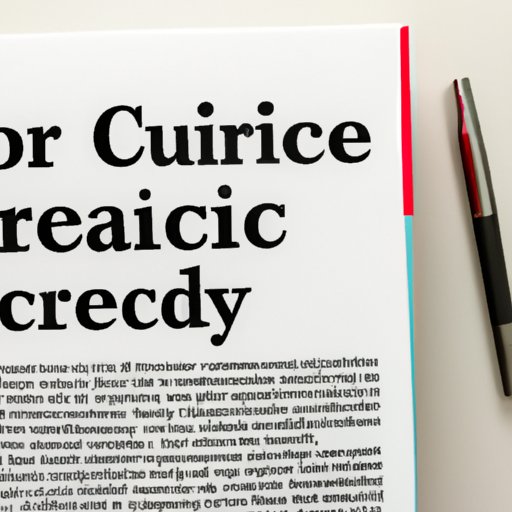Introduction
Critical reading is an important skill that helps us to make better decisions, form stronger arguments, and assess information more effectively. It involves actively engaging with the material, rather than passively consuming it. By being a critical reader, we can learn to think more deeply about the topics we read, ask questions, and draw our own conclusions.
Definition of Critical Reading
Critical reading is the process of actively engaging with written material by questioning, analyzing, and evaluating the text. It involves paying attention to the author’s main argument, looking for evidence to support or refute the argument, and considering alternative interpretations. Critical readers are able to identify bias in sources, recognize when an argument is unsupported, and draw their own conclusions.

Benefits of Being a Critical Reader
Being a critical reader has many benefits. It helps us to think more deeply about the topics we read, gain a better understanding of the material, and develop our own opinions. Critical reading also allows us to identify faulty logic, spot inconsistencies, and uncover underlying assumptions. Finally, it helps us to evaluate sources for accuracy and credibility, so we can make more informed decisions.
Identify and Analyze the Author’s Main Argument
The first step in becoming a critical reader is to identify and analyze the author’s main argument. This means understanding what the author is trying to say, and why they are saying it. To do this, you need to define the argument, evaluate the evidence used to support the argument, and consider alternative interpretations.
When defining the argument, ask yourself what the author is trying to prove. Is it a fact-based claim, or an opinion-based argument? Once you have identified the main point, look for evidence to support the argument. Does the author provide facts or personal anecdotes to back up their claims? Are the sources credible? Do the facts presented match the conclusion drawn?
It is also important to consider alternative interpretations. Does the author take into account other points of view? Are there any biases present in the argument? By evaluating the evidence and considering multiple perspectives, you can get a better understanding of the material.
Ask Questions While Reading
Asking questions while reading is another important part of being a critical reader. As you read, ask yourself what the author is trying to say, and why they are saying it. What is the main point? How did the author arrive at their conclusions? Are there any assumptions being made? Answering these questions can help you better understand the material.
You should also look for connections between the evidence and the conclusion. Does the author provide enough evidence to support their claims? Are the facts accurate? Are there any gaps in the argument? Asking these questions can help you identify areas where the argument could be strengthened.
Research to Validate Claims
In addition to asking questions, it is important to research the material to validate the claims. Look for sources that confirm or refute the author’s argument. Check for bias in sources, and make sure they are reliable and accurate. You can also use online resources to verify facts and figures.
When researching, pay attention to the source. Is the source credible? Is the author an expert on the topic? Does the source provide evidence to support its claims? Taking the time to research can help you determine if the evidence presented is valid.
Compare Different Sources
To get a more complete understanding of the material, it is important to compare different sources. Gather multiple perspectives on a topic, and consider divergent points of view. This will help you to see the issue from different angles, which can lead to more informed conclusions.
When comparing different sources, look for similarities and differences. Are the facts consistent across sources? Are there any discrepancies? Are there any biases present? Analyzing multiple sources can help you draw your own conclusions.
Develop an Opinion on the Topic
Finally, it is important to develop an opinion on the topic. Assess the quality of evidence presented, and make connections between evidence and claims. Use your analysis to build a strong argument and support your opinion with evidence. By doing this, you can become a more informed and confident reader.
Conclusion
Becoming a critical reader is an important skill that helps us to make better decisions, form stronger arguments, and assess information more effectively. It involves actively engaging with the material, rather than passively consuming it. To be a critical reader, identify and analyze the author’s main argument, ask questions, research sources, and develop your own opinion. Remember to look for evidence to support or refute the argument, consider alternative interpretations, and compare different sources.
(Note: Is this article not meeting your expectations? Do you have knowledge or insights to share? Unlock new opportunities and expand your reach by joining our authors team. Click Registration to join us and share your expertise with our readers.)
